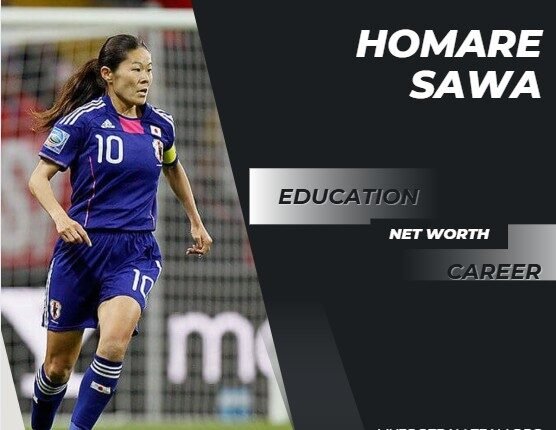Homare Sawa is one of the most iconic and influential figures in women’s football. Widely regarded as one of Japan’s greatest footballers, Sawa’s career has been marked by exceptional achievements, both on and off the field. Known for her leadership, technical skill, and vision, Sawa has left an indelible mark on the game. In this article, we explore her education, career highlights, and financial success, showcasing the legacy she has built over the years.
| Attribute | Details |
|---|---|
| Full Name | Homare Sawa |
| Date of Birth | September 6, 1978 |
| Place of Birth | Fukuoka, Japan |
| Nationality | Japanese |
| Height | 1.63 m (5 feet 4 inches) |
| Position | Midfielder |
| Youth Career | Fukuoka Jiyu Gakuen High School |
| College | Chuo University |
| Senior Career | 1993–2015 (Nippon TV Beleza, Atlanta Beat, INAC Kobe Leonessa) |
| National Team Debut | 1993 |
| Retirement | 2015 (International), 2015 (Club) |
| Caps (National Team) | 205 (Japan) |
| Goals (National Team) | 83 (Japan) |
| Major Trophies | 2011 FIFA Women’s World Cup, Olympic Silver Medal (2012), 6 Nadeshiko League titles, 5 AFC Asian Cup titles |
| Individual Awards | Golden Ball (2011 Women’s World Cup), Asian Footballer of the Year (2011), Nadeshiko League Best Player (multiple years) |
| Net Worth | $1–3 million (approx.) |
Early Life and Education
Homare Sawa was born on September 6, 1978, in Fukuoka, Japan. From a young age, she showed a deep passion for football, often playing with her brothers and showing exceptional talent on the field. Despite being a female in a traditionally male-dominated sport, Sawa was determined to pursue her dreams.
High School and Early Football Development
Sawa attended Fukuoka Jiyu Gakuen High School, where she focused on her academics while also developing her skills as a footballer. During her high school years, Sawa honed her technical skills and deep understanding of the game. Her talent became apparent to scouts, and soon she began to receive offers to play at the professional level. However, she made sure to balance her education with her budding football career.
College Education
After high school, Sawa decided to continue her education while playing football. She enrolled at Chuo University, one of Japan’s prominent academic institutions. While her university years allowed her to grow both intellectually and as an athlete, Sawa’s football ambitions grew stronger. She played for the university’s team, which was highly competitive and helped her prepare for professional football.
During this period, Sawa also participated in numerous youth national team camps, which allowed her to gain experience and make her mark on the international stage.
Professional Football Career
Homare Sawa’s professional career began in 1993, when she joined the Nippon TV Beleza team in Japan’s top women’s league. Her rise in Japanese women’s football was meteoric, and she became a key player for both her club and the Japanese national team.
Domestic Career
Sawa spent the majority of her club career with Nippon TV Beleza, where she helped the team win multiple league titles. Over the years, she became one of the most prominent figures in Japanese football, known for her vision, passing ability, and leadership.
Her time at Beleza was marked by numerous individual honors and accolades, including winning the Nadeshiko League Best Player award multiple times. Under her leadership, the team achieved great success, both domestically and internationally, becoming one of the most dominant teams in women’s football.
Sawa also had brief stints with European clubs. In 2009, she joined Atlanta Beat in the WPS (Women’s Professional Soccer) league in the United States. This international experience allowed her to develop new skills and bring a different perspective to her game, enhancing her versatility as a player.
International Career
Sawa’s international career with the Japan Women’s National Football Team is where she truly shined. She made her debut for the national team in 1993, at the age of just 15, and became a mainstay in the team for the next two decades.
One of the most iconic moments of Sawa’s career came in the 2011 FIFA Women’s World Cup, where she led Japan to their first-ever World Cup victory. Sawa played a crucial role in the tournament, scoring key goals, including a goal in the final against the United States. Her performance earned her the Golden Ball as the tournament’s best player, and her leadership was instrumental in Japan’s victory.
In addition to the World Cup, Sawa represented Japan in multiple Olympic Games and Asian Cups, helping her country win numerous regional titles and consistently perform at the highest level.
Retirement
Sawa retired from international football in 2015, leaving behind a legacy that has inspired generations of players. She continued to play at the club level for a few years before announcing her retirement from professional football in 2015.
Awards and Achievements
Homare Sawa’s career is laden with awards and recognition, both for her individual brilliance and her contributions to the growth of women’s football. Some of her major achievements include:
- 2011 FIFA Women’s World Cup Champion
- Golden Ball at the 2011 Women’s World Cup (Best Player of the Tournament)
- FIFA Women’s World Cup All-Star Squad (multiple years)
- Asian Footballer of the Year (2011)
- Nadeshiko League Best Player (multiple years)
- Olympic Silver Medalist (2012)
- Order of the Rising Sun: A prestigious honor awarded to Sawa in recognition of her contributions to Japanese football.
In addition to her tournament wins, Sawa has been an advocate for women’s sports and has used her platform to push for gender equality within football.
Net Worth and Financial Success
Homare Sawa’s net worth is estimated to be between $1–3 million. Her financial success comes from a combination of club salaries, endorsements, and her career as a national team player.
Club Earnings and Endorsements
While women’s football does not have the same financial backing as men’s football, Sawa’s status as one of the sport’s best players helped her secure lucrative endorsements and sponsorships with major brands. She was the face of various campaigns throughout her career, including partnerships with Adidas and Asahi.
Post-Retirement Ventures
After retiring, Sawa transitioned into roles that continue to contribute to her net worth. She became involved in coaching and mentoring younger players, sharing her expertise to help grow women’s football in Japan and beyond. Additionally, Sawa continues to be an advocate for women in sports, participating in various conferences, interviews, and campaigns.
Legacy and Influence
Homare Sawa’s impact on football extends far beyond her achievements on the pitch. As one of the pioneers of women’s football in Japan, she helped elevate the game both domestically and internationally. Her leadership in Japan’s 2011 World Cup victory was a historic moment for the country, inspiring countless young girls to pursue football.
Beyond her playing career, Sawa has dedicated herself to the development of the sport, taking on roles in coaching and mentoring. She is also active in pushing for more opportunities and equal pay for female athletes.
Her influence is evident in the rise of women’s football in Japan, where the sport is now widely followed and celebrated. The establishment of the Nadeshiko League as one of the strongest women’s football leagues in the world owes much to the efforts of players like Sawa.
Conclusion
Homare Sawa’s journey is a testament to dedication, hard work, and breaking barriers. From her early days in Japan to her international triumphs, she has shaped the future of women’s football. Through her skills, leadership, and advocacy, Sawa has ensured her legacy will last for generations.
Her net worth is just one reflection of her success, but it is her influence, both on the pitch and in society, that truly solidifies her place as one of the greatest footballers in history.









